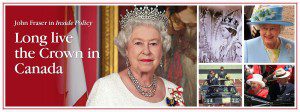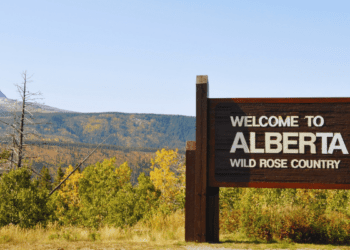 As Canada’s wise and forbearing Queen, Elizabeth II, becomes the longest serving monarch, John Fraser argues in the National Post that it is worth considering that a constitutional Crown may be as great an ally to democracy as we have, and to warn against the alternatives proposed by the opponents of this hugely undervalued institution.
As Canada’s wise and forbearing Queen, Elizabeth II, becomes the longest serving monarch, John Fraser argues in the National Post that it is worth considering that a constitutional Crown may be as great an ally to democracy as we have, and to warn against the alternatives proposed by the opponents of this hugely undervalued institution.
This is based on an essay for MLI’s magazine, Inside Policy.
By John Fraser, Sept. 8, 2015
As Her Majesty Queen Elizabeth II surpasses Queen Victoria’s record as the longest reigning monarch on Wednesday, celebrating the simple endurance of this redoubtable, duty-bound sovereign offers a chance to consider the benefits Canada receives from her mere presence as our head of state, and to explain the continuing importance of the Crown in Canada.
Over the last 63-and-a-half years, the Queen has borne patiently all of our constitutional ups and downs, the slings and arrows of separatist aspirations in Quebec and often inchoate nationalist yearnings in English Canada. She has been afflicted with bozo cabinet ministers assigned to accompany her on royal tours who were avowed republicans, as well as the smug assurances of writers and academics who feel called upon to let her know she and her hard-working heirs are nothing more than “free-loading” tourists in Canada. And yet, these past six decades, she has never — to use her own words — been “a fair-weather friend”. Never once has she complained. She has done what her Canadian prime ministers and provincial premiers have advised her to do, for good or ill, but she also kept a tactful distance from their politics. She is experienced and wise beyond measure, and forbearing to a fault.
Trying to persuade the monarchy’s detractors is not unlike trying to explain an opera to someone fixated on the plot and for whom the music is irrelevant. Nevertheless, here goes. Let’s establish three unassailable facts:
- The Crown exists;
- It is virtually impossible to eliminate; and
- It works better than most Canadians appreciate.
I presume I don’t have to prove that that the Crown of Canada exists and has existed since the first European incursions in the New World. It was against the Crown that the First Nations waged war, made peace and signed treaties. It existed in both the French and British colonial periods. It existed and was crucial throughout the period leading up to and after Confederation. It infuses our parliamentary, social and geographical history.
In the United States, on the other hand, they keep re-electing George III every four years. That’s only partially whimsical sarcasm. The American founders let their indirectly elected president choose his own cabinet, as George III did. They let him veto bills from the legislative assemblies, as President Barack Obama can still do. Covert wars could be carried out without recourse to Congress as they still can be (until money voted by a lower legislative house is needed to support or expand the wars, which was George’s problem, as well). No one imagined that the Crown could or would evolve in the way it has under the parliamentary system; the sovereign upholds the dignity of the state but relinquished its legislative and coercive powers while cabinet ministers must undergo the discipline of electioneering and endure questioning in the House.
As for eliminating the Crown, opponents have tried to offer easy solutions based on various re-readings and reinterpretations of our Constitution, but the unassailable fact remains that it needs the approval of all the legislatures of the country. And of course, the nature of an alternative system would have to be resolved beforehand. This became virtually entrenched with the constitutional settlements engineered by former prime minister Pierre Trudeau in 1982.
In 1999, a referendum on the apparently popular idea of ditching the monarchy was held in Australia, our closest constitutional cousin. But when it came time to say aye or nay, Australians didn’t fancy any more power going into the hands of an already too powerful, democratically elected federal prime minister. The “devil-known” trumping the “devil unknown” is hardly a rousing battle cry, but it does reinforce the notion that for the maintenance of civil society and governance, a constitutional Crown may be as great an ally to democracy as we have in our shaky arsenal of constitutional safeguards.
Finally, although during the lead-up to Confederation in 1867, few imagined the role of appointed representatives of the sovereigns, the governors general and lieutenant governors, would evolve into an effective system of embracing and embellishing the happy multicultural reality of Canada. It has become one of the salient and unique features of Canadian governance. The Crown functions efficiently in the quiet areas of legislative approvals, in a system of honours for worthy Canadians, in separating our notion of the state from the sometimes sordid or creepy manifestations of Realpolitik.
As Philip Murphy recounts in his book, Monarchy and the End of Empire, the Queen was “advised” in 1973 by British Prime Minister Edward Heath (who had recently ended an arms embargo against the apartheid state of South Africa) that she should not attend a Commonwealth Prime Ministers Conference in Ottawa. In an adroit countermove, she then asked the advice of Canadian Prime Minister Pierre Trudeau, who said the Queen of Canada should certainly be there. She presided as our head of state and Heath was shamed into coming.
Indeed, the Queen of Canada has probably been helping the Queen of England on all sorts of subjects on which she is well versed, from separatism in both Quebec and Scotland, to corruption and hanky-panky in legislative upper chambers.
And finally, this wonderful institution and this remarkable woman can yet help non-aboriginal Canadians continue to heal our greatest systemic wound and create a better future for aboriginal peoples. The symbolism inherent in the Canadian notion of the “Honour of the Crown” — the implicit constitutional obligation to consult with First Nations on matters affecting them — could offer a safe passage beyond all the hurt and misunderstanding of the past.
Taking advantage of this gift offered by the great lady still on her throne may prove to be the single most important benefit Canadians can receive from the Crown. For that reason alone, the memorable milestone Elizabeth II passed this year is worth much celebration.
John Fraser is president of the Institute for the Study of the Crown and president and CEO of the National Newsmedia Council. This article is based on an essay for Inside Policy, the magazine of the Macdonald-Laurier Institute (macdonaldlaurier.ca).




